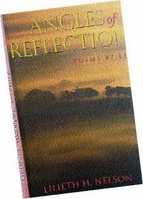
Angels of Reflection - Poems by LIL written by Lilieth Nelson. - Paul Williams photo
Title: Angles of Reflection
Author: Lilieth Nelson
Publisher: Self-published
Reviewer: Paul H. Williams
Lilieth Nelson is a scientist bitten by the literary bug. After years of writing and foraying in the arts, this science educator has finally published her book of reflective poems.
The note on the rear outside cover of the 117-page paperback says, inter alia, "Lilieth, an 'artistic scientist', has been writing poems for over 45 years, but she 'never had the courage to expose herself on paper'. Angles of Reflection, her first publication of poems, is her invitation to a peek into her inner self."
But what does Lilieth have on her mind that is worthy of being exposed on paper? If you read the five-part collection of reflections from many angles, you will find that she has much to say from acute, right, obtuse and reflex angles, and from a full-circle perspective.
'Acute Angle',
In 'Acute Angle', man's callous attitude to man, sexual surrender and dissatisfaction, hope and deception are some of the themes explored. The point of view was short, penetrating and funny in 'Virgin Gloat'. Nelson writes, "She lost/Her virginity/Seven times/And each thought/He was/The heroic one." She ended the section with 'Science Lesson'. This is a fusion of the arts and science. It's a five-part poem of the stages in the life cycle, namely reproduction, gestation, birth, growth and death.
From 'Right Angles', Nelson turns her reflection on Christ and the new millennium in 'Contemplation at Christmas', 'Sitting on the threshold of the Year 2000', 'The star, our light', 'Easter song', 'A song of thanksgiving', 'Basking in the light', 'Christmas 200' and 'If only we knew', in which she retells the Nativity story. In retrospect, she says at the end, "So we like they/ As the night's winds blew/ Would in our hearts make room/ If only we knew."
Nelson's strong feelings on certain issues affecting the world were exposed in 'Obtuse Angles'. She resents imperialism and questions its presumptuousness in 'Unanswered questions or an appeal to the leader of a great country'. "What gives you the right/To decide who must die/To such question/You lone know why ... Who gave you the key/To divinity/Is your telephone line/The one and only ... Is your divine appointment/A pie in the sky/Or just a figment in your/ Myopic mind's eye?" she asks sarcastically. 'The day Mr Mandela walked free' and 'Obama's triumph' are tributes to these great men. And her annoyance with a certain practice is betrayed in 'Cell phone epidemic'.
generosity of spirit
The penultimate section, 'Reflex Angles', reflects Nelson's generosity of spirit as most of the poems in this section are a dedication. 'Miss Lou', 'Prof', 'Vilma', 'Marlene', 'Pablo who turned 60', 'Ma Lew who turned 90', 'Enid at ... 80 years', 'Mrs Clarice Davis', 'Tracy' and 'Donovan who cut the lawns' were all acknowledged for some reason or the other. This was after the opening nostalgic pieces of 'Old time Christmas' and 'The table or at the mission house'.
The nostalgia continues when Nelson comes 'Full Circle' in the final section with 'The chicken and me', 'Town girl' and in 'The day Aunt Ive came home too soon' "two cousins too carried away/to hear the footsteps/ coming round the house/no time to hide/the telltale signs/of sugar grains glued/to hot cheeks/encircling the mouth/our tails paid for the lie/Aunt Ive could spot a missing grapefruit/ from afar'. There are also memories of 'Sitting in Hope Gardens', it being a place of hope. The book ends with Stefan, Nelson's son, appealing for peace in 'No more war'.